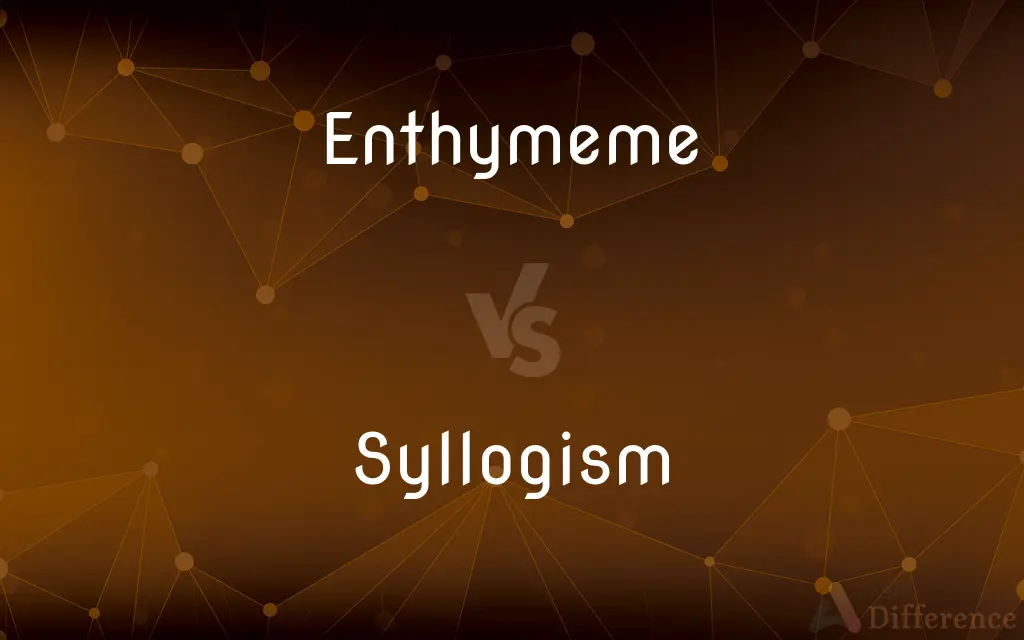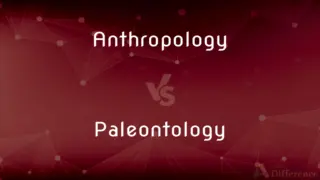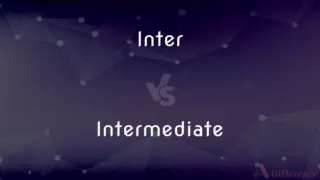Enthymeme vs. Syllogism — What's the Difference?

Difference Between Enthymeme and Syllogism
ADVERTISEMENT
Compare with Definitions
Enthymeme
An enthymeme (Greek: ἐνθύμημα, enthýmēma) is a rhetorical syllogism used in oratorical practice. Originally theorized by Aristotle, there are four types of enthymeme, at least two of which are described in Aristotle's work.Aristotle referred to the enthymeme as "the body of proof", "the strongest of rhetorical proofs...a kind of syllogism" (Rhetoric I, 1.3,11).
Syllogism
A syllogism (Greek: συλλογισμός, syllogismos, 'conclusion, inference') is a kind of logical argument that applies deductive reasoning to arrive at a conclusion based on two propositions that are asserted or assumed to be true. In its earliest form (defined by Aristotle in his 350 BCE book Prior Analytics), a syllogism arises when two true premises (propositions or statements) validly imply a conclusion, or the main point that the argument aims to get across.
Enthymeme
A syllogism in which one of the premises or the conclusion is not stated explicitly.
Syllogism
(Logic) A form of deductive reasoning consisting of a major premise, a minor premise, and a conclusion; for example, All humans are mortal, the major premise, I am a human, the minor premise, therefore, I am mortal, the conclusion.
Enthymeme
A by and large statement, a maxim, an argument that is intended to be generally true and not apply to every case universally.
ADVERTISEMENT
Syllogism
Reasoning from the general to the specific; deduction.
Enthymeme
(logic) A syllogism with a required but unstated assumption.
Syllogism
A subtle or specious piece of reasoning.
Enthymeme
An argument consisting of only two propositions, an antecedent and consequent deduced from it; a syllogism with one premise omitted; as, We are dependent; therefore we should be humble. Here the major proposition is suppressed. The complete syllogism would be, Dependent creatures should be humble; we are dependent creatures; therefore we should be humble.
Syllogism
(logic) An argument whose conclusion is supported by two premises, of which one contains the term that is the predicate of the conclusion, and the other contains the term that is the subject of the conclusion; common to both premises is a term that is excluded from the conclusion.
Syllogism
(obsolete) A trick, artifice; an extremely subtle, sophisticated, or deceptive argument; a sophism.
Syllogism
The regular logical form of every argument, consisting of three propositions, of which the first two are called the premises, and the last, the conclusion. The conclusion necessarily follows from the premises; so that, if these are true, the conclusion must be true, and the argument amounts to demonstration
Syllogism
Deductive reasoning in which a conclusion is derived from two premises
Share Your Discovery

Previous Comparison
Anthropology vs. Paleontology
Next Comparison
Inter vs. Intermediate













































